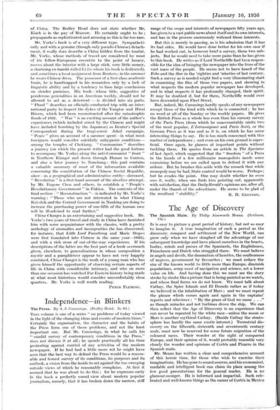Independence—in Blinkers
The Press. By A. J. Cummings. (Bodley Head. 3s. (id.) Tnis volume is one of a series " on problems of today viewed in the light of the changing ideas and events of modern times." Certainly the organisation, the character and the habits of the Press form one of those problems, and not the least important one. But Mr. Cummings, in what he calls his " candid survey of contemporary conditions in the Press," does not discuss it at all ; he spends practically all his time protesting against control of any activities of the modern newspaper. If he had had a little more wit he might have seen that the best way to defend the Press would be a reason- able and honest survey of its conditions, its purposes and its outlook, a vision from the inside to set againstthe too sweeping outside views of which• he reasonably complains. At first it seemed that he was about to do this ; for he expresses early in the book a perfectly sound view about modern popular journalism, namely, that it has broken down the narrow, stiff
range of the scope and interests of newspapers fifty years ago, has given to a vast public news about itself and its own interests, and has in the process enormously widened those interests.
But this is merely in passing, as is his admission that it has its bid sides. He would have done better for his own ease if he had worked out, in however brief a survey, these two sub- jects. But he would need to take more pains than he has given to this book. He writes as if Lord Northcliffe had been respon- sible for the idea of bringing the newspaper into the lives of the vast mass of the people. He seems not to have heard of the Echo and the Star in the 'eighties and 'nineties of last century.
Such a survey as is needed might find a very illuminating start in examining the files of those two papers, and showing in what respects the modern popular newspaper has developed, and in what respects it has profoundly changed, their spirit. It may be doubted if, but for them, Northcliffe would ever have descended upon Fleet Street.
But, indeed, Mr. Cummings hardly speaks of any newspapers except those of the kind with which he is connected ; he has no word at all of the Sunday or the weekly papers. He gives the British Press as a whole less even than his cursory survey of the Paris Press (from which he unaccountably omits two of the most popular, L'Intransigeant and Paris Soir), or the German Press as it was and as it is, on which he has some interesting things to say. He is too much concerned with this matter of independence ; and even on his own ground is super- ficial. Once again, he glances at important points without tackling them. He quotes from an article in The Spectator of last April, which suggested that the " freedom " of a Press in the hands of a few millionaire monopolists needs some examining before we are called upon to defend it with any ardour. But he brushes this aside with the remark that while monopoly maybe bad, State control would be worse. Perhaps ; but he evades the point. One may doubt whether he even sees it, really, when one finds him pointing out, apparently with satisfaction, that the Daily Herald's opinions are, after all, under the thumb of the advertisers. He seems to be glad of










































 Previous page
Previous page